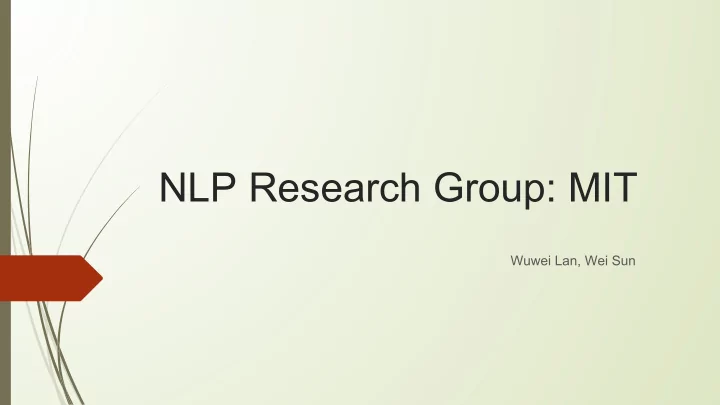

NLP Research Group: MIT Wuwei Lan, Wei Sun
NLP@MIT • Introduction • group @ CSAIL • 2 Professors + 9 Ph.D. + 4 Masters + other undergraduates • Faculty • Regina Barzilay and Tommi S. Jaakkola • Research Focus • very broad : Information retrieval, deep reinforcement learning, recommender systems, Computational biology, Semantic representation and so on. • Productivity • •6~7 top conference papers / year
Regina Barzilay • Reliable Information Extraction • Reinforcement learning by acquiring external evidence (EMNLP 2016) • Interpretable Neural Models • Rationalizing Neural Predictions (EMNLP 2016)
Tommi S. Jaakkola Biography 1992, M.S in theoretical physics from Helsinki University of Technology 1997, PhD in computational neuroscience from MIT 1998-now Professor at MIT
Research Synopsis • On the theoretical side statistical inference and estimation • On the applied side NLP , computational biology, recommender, information retrieval
On-going projects and papers 1. Perturbation models Structured prediction: From gaussian perturbations to linear-time principled algorithms. In Uncertainty in Artificial Intelligence (UIA), 2016 1. Syntactic and semantic parsing word embeddings as metric recovery in semantic spaces. TACL 2016 1. Recommender systems Controlling privacy in recommender systems. NIPS 2014 1. computational biology Learning population-level diffusions with generative {RNN}s. ICML 2016 1. information retrieval/extraction Food adulteration detection using neural networks. EMLP, 2016
What’s interesting? Topic Modeling in Twitter: aggregating tweets by conversations ICWSM 2016 1. Background: Topic Modeling Techniques: Latent Dirichlet Allocation(LDA) and Author-Topic Model (ATM) -> For sufficient long documents with regular vocabulary and grammatical structure 2. what’s about the tweets? (short document and noisy data) -> preprocessing tweets for ungrammatical structure and informal language -> pooling techniques to aggregate tweets into long documents: User-pooling, Hashtag-pooling and conversation-pooling 3. Can we build a model solve the topic modeling problem in twitter directly?
Recommend
More recommend